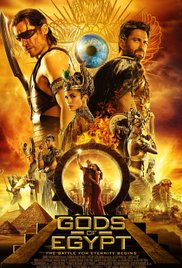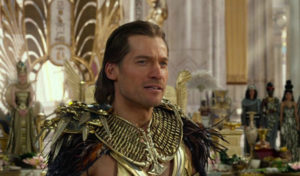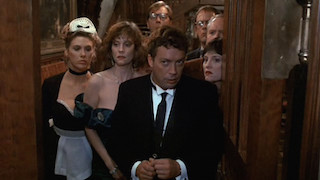 I feel there is not a lot of people itching to read a review of Gods of Egypt because, well, based on box office numbers, not many people saw Gods of Egypt. Now, there are plenty of reasons that could have been; a white-washed cast, a non-culturally-trendy subject-matter, or (and likely) the surprise blockbuster, Deadpool, killing it for weeks on end. Regardless, the film is bold and brash, if not sometimes impressive, in its
I feel there is not a lot of people itching to read a review of Gods of Egypt because, well, based on box office numbers, not many people saw Gods of Egypt. Now, there are plenty of reasons that could have been; a white-washed cast, a non-culturally-trendy subject-matter, or (and likely) the surprise blockbuster, Deadpool, killing it for weeks on end. Regardless, the film is bold and brash, if not sometimes impressive, in its overuse of a CGI fantasy setting and does make for a decent popcorn flick. It almost makes you wonder why this wasn’t a late Summer offering. Much like Hercules the previous year, why was this not the last semi-star driven film that wraps up the Summer with a resounding, “meh…”?
But if we dive in beyond dive in beyond the thin plot, lovesick heroes, and giant, fire-breathing serpents, do we find anything? Surprisingly, yes. There is a fair amount surrounding being content under a higher authority. Also, we see our unlikely hero, Bek (Brenton Thwaites), recklessly pursuing love despite setback and disappointment. While these are well-worth thinking on, the actual crux of the film (and motivation of our hero) surrounds the price of the afterlife. You see, death is often visited upon the Egypt in our story, but there is hope that even losing ones life is not the end of things. However, it does come with a price. It is that price that worries Bek throughout the film. His love, Zaya (Courtney Eaton), has died and there is a fear that, since she is poor, she will not be able to enter the afterlife due to not having anything of value brought with her. That’s right, you can have eternal life, but it’ll cost ya! We even get it illustrated for us as an untrustworthy looking fellow manages to fill his judgement scale with gold and offerings and is allowed to pass into the afterlife exclaiming, “I shall live… forever!” Meanwhile, a poor older woman has nothing to offer but a small ring and is disintegrated from existence. Not exactly a hopeful picture.
This is a disconcerting scene. What about all the things we cannot weigh? What about our good works? What about our kindnesses? Are the only ones destined to live in this afterlife the ones who do whatever it takes to garner a little extra gold? I am not sure that seems fair, much less and afterlife I want to spend time in. Fortunately, once order is restored (SPOILERS: the good guys win!), Horus (Nikolaj Coster-Waldau) sets things right:
 Horus, King of All Egypt: “From this moment on, the afterlife must be earned, not with gold, but by good deeds, compassion, and generosity. What we do– how we act– in this life matters.”
Horus, King of All Egypt: “From this moment on, the afterlife must be earned, not with gold, but by good deeds, compassion, and generosity. What we do– how we act– in this life matters.”
Way to go Horus! Finally people can get into the afterlife– they just have to be good enough. But what is good enough? I guess it would be rude to stand in front of the King of all Egypt and ask him some clarifying questions. How many good deeds does it take to get into the afterlife? How much compassion must I show to outweigh the selfish things I’ve done? How generous? Like, ten percent generous? More? What if I am generous, but only with the people I like? I mean, it’s still generosity, right?! This may be more complicated than I had hoped.
“As it is written: “There is no one righteous, not even one;” -Romans 3:10
Bummer. Actually, it’s worse than that because Isaiah 64 further tells us, “…all our righteous acts are like filthy rags…” Not good news at all if we’re hoping that we can simple live good lives and are kind to one another. It would seem to imply there is nothing I can do that would be considered good… or compassionate… or generous– not truly. This creates a problem. A big problem. If we don’t have it inside ourselves to do good then we’ll need something– or someone– to speak on our behalf or take our place. Fortunately, there is such a person, and luckily, he is also the one who stands in judgement so he knows the rules already. Christ volunteers to be this for humanity because humanity can’t do it for themselves (despite what popular culture would like you to believe). It sounds great and all to just “make the world a better place than how you found it” or to “send out good vibes to the world”– and don’t get me wrong, Horus is right about one thing, what we do– how we act– in this life does matter, but it doesn’t determine how we spend our afterlife. Honestly examining my own life– my own actions and motivations– I am grateful it isn’t up to me, less I stand in a similar situation to our poor older woman from the film.
 Ultimately, Gods of Egypt is a fairly subpar offering with just enough flash and Egyptian mythology thrown in that it makes for a moderately diverting time. In fact, a dive into the film thematically becomes more problematic than if we let it simply pass us by as popcorn fodder. So, do just that. Grab a jumbo-size popcorn because this one could keep you shoveling it for the entire duration. But, if you do stop and think about the implications of earning your way to the afterlife, know that the film’s solution is more worrisome than its box office numbers.
Ultimately, Gods of Egypt is a fairly subpar offering with just enough flash and Egyptian mythology thrown in that it makes for a moderately diverting time. In fact, a dive into the film thematically becomes more problematic than if we let it simply pass us by as popcorn fodder. So, do just that. Grab a jumbo-size popcorn because this one could keep you shoveling it for the entire duration. But, if you do stop and think about the implications of earning your way to the afterlife, know that the film’s solution is more worrisome than its box office numbers.
